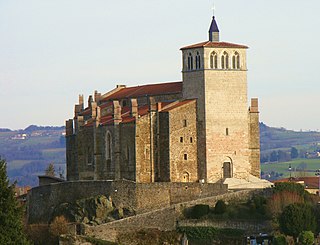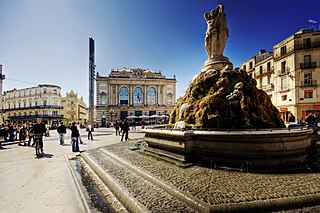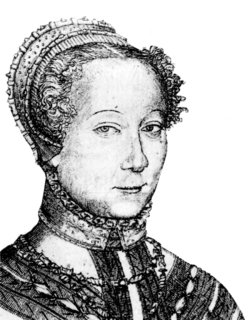
Louise Labé,, also identified as La Belle Cordière, was a feminist French poet of the Renaissance born in Lyon, the daughter of wealthy ropemaker Pierre Charly and his second wife, Etiennette Roybet.
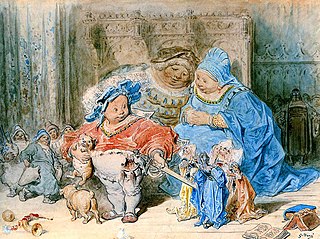
The Life of Gargantua and of Pantagruel is a pentalogy of novels written in the 16th century by François Rabelais, which tells of the adventures of two giants, Gargantua and his son Pantagruel. The text is written in an amusing, extravagant, and satirical vein, and features much crudity, scatological humor, and violence.

Materia medica is a Latin term from the history of pharmacy for the body of collected knowledge about the therapeutic properties of any substance used for healing. The term derives from the title of a work by the Ancient Greek physician Pedanius Dioscorides in the 1st century AD, De materia medica, 'On medical material'. The term materia medica was used from the period of the Roman Empire until the 20th century, but has now been generally replaced in medical education contexts by the term pharmacology. The term survives in the title of the British Medical Journal's "Materia Non Medica" column.
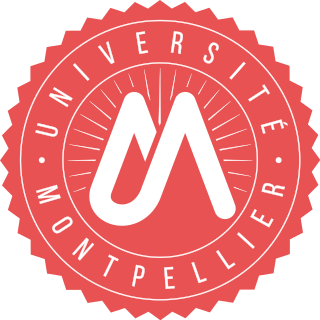
The University of Montpellier is a French public research university in Montpellier in south-east of France. Established in 1289, the University of Montpellier is one of the oldest universities in the world.

Guillaume Rondelet, known also as Rondeletus (Rondeletius), was Regius professor of medicine at the University of Montpellier in southern France and Chancellor of the University between 1556 and his death in 1566. He achieved renown as an anatomist and a naturalist with a particular interest in botany and zoology. His major work was a lengthy treatise on marine animals, which took two years to write and became a standard reference work for about a century afterwards, but his lasting impact lay in his education of a roster of star pupils who became leading figures in the world of late-16th century science.

Nicholas Bourbon was a French court preceptor and poet. He wrote a collection of poems called Nugae, which are known as the Bagatelles in French. He is the great-uncle of Nicholas Bourbon (1574–1644), a member of the Académie française.
French Renaissance literature is, for the purpose of this article, literature written in French from the French invasion of Italy in 1494 to 1600, or roughly the period from the reign of Charles VIII of France to the ascension of Henry IV of France to the throne. The reigns of Francis I and his son Henry II are generally considered the apex of the French Renaissance. After Henry II's unfortunate death in a joust, the country was ruled by his widow Catherine de' Medici and her sons Francis II, Charles IX and Henry III, and although the Renaissance continued to flourish, the French Wars of Religion between Huguenots and Catholics ravaged the country.
François Béroalde de Verville was a French Renaissance novelist, poet and intellectual. He was the son of Matthieu Brouard, called "Béroalde", a professor of Agrippa d'Aubigné and Pierre de l'Estoile and a Huguenot; his mother, Marie Bletz, was the niece of the humanist and Hebrew scholar François Vatable. At the time of the St. Bartholomew's Day Massacre, his family fled to Geneva (1573), but Béroalde returned to Paris in 1581. During the civil wars, Béroalde abjured Calvinism and joined the factions around Henri III of France. In 1589 he moved to Tours, and became chanoine (canon) of the cathedral chapter of Saint Gatien, where he remained until his death.
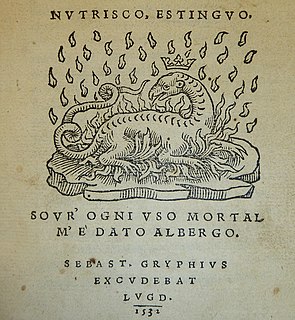
Sebastian Gryphius was a German bookseller-printer and humanist.

Glanate was a Gallo-Roman town on the right bank of the Var, which became the episcopal see of Glandève.

The Château du Rivau is a castle-palace in Lémeré (Indre-et-Loire), in the Touraine region, France. In Rabelais' Gargantua, it was given to captain Tolmere as a reward for his victories in the Picrocholean Wars.

Robert Cockburn was a 16th-century Scottish diplomat and cleric.
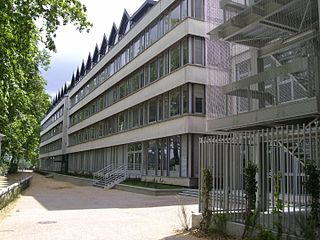
The University of Tours, formally François Rabelais University, is a public university in Tours, France. The university was formerly named after the French writer François Rabelais, and was founded in 1969. As of July 2015 it is a member of the regional university association Leonardo da Vinci consolidated University.
Madeleine Des Roches was a French writer of the Renaissance. She was the mother of Catherine Fradonnet, called Catherine Des Roches, to whom she taught poetry, literature and ancient languages. She is a writer in the tradition of Christine de Pizan and others, working to establish a community of women writers.
The Orus Apollo is a manuscript work by Nostradamus written before 1555, and formerly owned by Jean-Baptiste Colbert, Louis XIV's finance minister. It contains two books of 182 verse epigrams. Its full title is ORUS APOLLO FILS DE OSIRIS ROY DE AEGYPTE NILIACQUE. DES NOTES HIEROGLYPHIQUES.
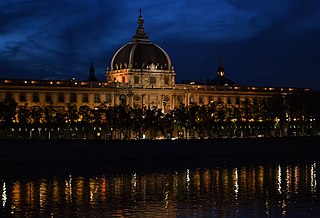
Hôtel-Dieu de Lyon was a hospital of historical significance situated on the west bank of the Rhone river, on the "Presque-isle". It has been out of use since 2010.

Maurice Jules Abel Lefranc was a historian of French literature, expert on Rabelais, and the principal advocate of the Derbyite theory of Shakespeare authorship.
Without Fear or Blame or Sans peur et sans reproche is a French comedy film released in 1988. The film is directed by Gérard Jugnot.


